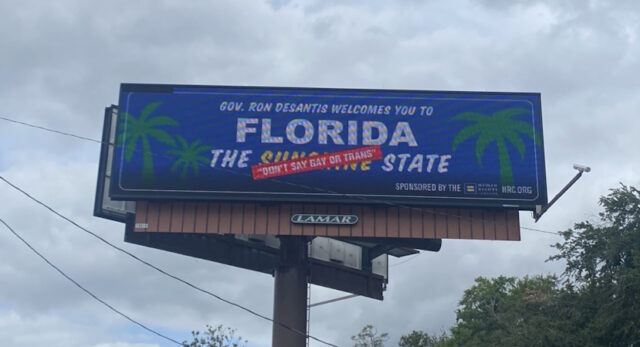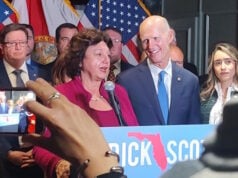
Gov. Ron DeSantis was quick out the door with a claim that a settlement in a legal challenge to his Parental Rights in Education Act— or Don’t Say Gay — vindicated his efforts “to keep radical gender and sexual ideology out of the classrooms of public-school children.”
In fact, the settlement agreement’s terms also limit enforcement of that law (HB 1577), which the governor pushed through the Legislature two years ago to bar public school instruction about sexual orientation and gender identity through grade three (subsequently expanded through higher grades).
Gov. Ron DeSantis holds a large print of a children’s book about a transgender kid on March 28, 2022.
Credit: screenshot/Florida Channel
The state signed the settlement on Monday, one week after a federal appeals court blocked another DeSantis law, the 2022 Individual Freedom Act, (HB 7) known as the Stop Woke Act.
That law would subject any individual to believe concepts that would constitute discrimination, such as “members of one race, color, national origin, or sex are morally superior to members of another race, color, national origin, or sex.” The law relates to both businesses and public schools.
To the extent it prevents private companies from requiring employees to attend diversity and inclusion training, a federal judge in Tallahassee ruled in August 2022 that the law was unconstitutional as applied to businesses and a three-judge panel of the U.S. Court of Appeals for the Eleventh Circuit affirmed that ruling this March 4.
Meanwhile, the Legislature has voted to extend the stop-woke principle to teacher education programs, via a bill holding that certification curricula “may not distort significant historical events or include a curriculum or instruction that teaches identity politics … or is based on theories that systemic racism, sexism, oppression, and privilege are inherent in the institutions of the United States and were created to maintain social, political, and economic inequities.”
In a press release related to Don’t Say Gay, the governor’s office called the settlement “a major win against the activists who sought to stop Florida’s efforts to keep radical gender and sexual ideology out of the classrooms of public-school children.”
“We fought hard to ensure this law couldn’t be maligned in court, as it was in the public arena by the media and large corporate actors,” DeSantis’ General Counsel Ryan Newman said in a written statement. “We are victorious, and Florida’s classrooms will remain a safe place under the Parental Rights in Education Act.”
The press release added: “Thanks to the leadership of Gov. DeSantis, the law remains in effect, and children will be protected from radical gender and sexual ideology in the classroom.”
LGBTQ wins
Yet the agreement also gives the organizations challenging the law, including Equality Florida, much of what they asked for, significantly curtailing limits on recognition of LGBTQ people and their rights.
For example, it’s now OK to:
- Speak openly about the topics in the classroom and assignments, including regarding the families of students and teachers.
- Operate gay-straight alliances plus other extracurricular activities and display rainbow stickers designating safe spaces.
- Punish bullying based on sexual orientation or gender identity.
Furthermore, the settlement agreement would appear to end purges of library books or movies and plays with LGBTQ characters and allow same-sex dancing at school events or dressing in line with one’s gender identity. The law can’t be used to discriminate against LGBTQ people and the state has to distribute the settlement’s stipulations to schools throughout the state.
Equality Florida executive director Nadine Smith addresses a news conference at the Florida Capitol on Jan. 16, 2024. Credit: Michael Moline
“This settlement not only reaffirms the rights of LGBTQ+ students and educators to live and speak openly but also marks a significant step towards rectifying the damage inflicted by the ‘Don’t Say Gay or Trans’ law. It’s a testament to what we can achieve when we stand united against discrimination and for the dignity of all LGBTQ+ people in Florida,” Nadine Smith, executive director of Equality Florida, said in a written statement following the agreement’s release Monday.
“This victory is more than a legal triumph; it’s a beacon of hope and a reminder of the power of collective action. It demonstrates our ongoing commitment to a Florida where everyone, regardless of their sexual orientation or gender identity, can live authentically and without fear,” Smith said.
“This is a step in the right direction, but the fight against this dangerous law continues — learning about diverse families should not be off-limits in Florida schools,” Katie Blankenship, director of PEN America’s Florida office, said in a separate statement.
“Thankfully, this settlement will bring books back to the shelves and restore open discourse on LGBTQ+ identity in our classrooms. But even with this victory and the clarification that the settlement provides, ‘Don’t Say Gay’ continues to chill protected expression and prevent age-appropriate education on important topics on the basis of partisan ideology,” Blankenship added.
PEN America had filed a friend-of-the-court brief in the case that produced the March 4 Eleventh Circuit ruling allowing diversity and inclusion training in businesses.
Confusion
DeSantis threw the public schools into confusion and conflict in pursuing the law as he prepared for his abortive campaign for the Republican presidential nomination. He claimed that LGBTQ activists were attempting to indoctrinate young people into an ideology.
Subsequent legislation specifically targeted the trans community, restricting use of pronouns or names reflecting their gender identity and access to bathrooms and changing rooms on that basis.
“While the settlement helps prevent overbroad interpretations of the bill and may mitigate its chilling effect, HB 1557 remains the law in Florida, and much of its harmful content will continue intact,” a PEN America press release says.
The organization notes that in January a federal judge refused to dismiss claims of viewpoint discrimination and denial of the right to receive information under the First Amendment against the Escambia County School Board’s sweeping ban on challenged books.
In the Equality Florida case, a federal trial judge in Tallahassee upheld the law. At the time of the settlement, an appeal was before the Eleventh Circuit.
Monday’s settlement agreement does give examples of what the state does not want to happen, pointing to:
- Policies in “multiple school districts” that “excluded parents from discussions and decisions on sensitive subjects related to students.”
- Instruction on the concepts of sexual orientation and gender.
- A Broward County policy that if the subject came up teachers should tell students that “transgender people change their gender once they are old enough to explain to others how they feel about their own gender.”
Defining terms
The settlement stipulates that instruction means “the formal work of teaching.” The law restricts instruction “on sexual orientation or identity” “in a classroom setting.” It defines the forbidden subjects as “an overview of modern gender theory or a particular view of marriage equality.”
“Typical class participation and schoolwork are not ‘instruction’ even if a student chooses to address sexual orientation or gender identity,” it reads. Teachers can respond to student discussions, including essays on the topics, and answer questions about their own families.
“For kindergarten through grade three, they simply must not handle these situations by teaching the subjects of sexual orientation or gender identity,” the agreement says.
It specifically clears literary treatments and notes that straight relationships entail a sexual orientation.
“The statute applies equally, regardless of viewpoint. Put differently, the stature restricts classroom instruction on sexual orientation and gender identity, not homosexuality and transgender identity. For example, it would violate the statute to instruct students that heterosexuality is superior or that gender identify is immutable based on biological traits.”
Andrew Spar, president of the Florida Education Association, believes the agreement will help the classroom teachers he represents a great deal.
“More than anything, teachers want to be able to provide their students with safe, inclusive learning environments that allow students to grow and thrive,” Spar said in a written statement.
“The settlement will now compel the state to provide much needed guidance for teachers, education staff professionals, faculty, parents and students. This clarity is key to making sure that LGBTQ+ community members feel supported in their pursuit of public education in Florida and reaffirms that we should not tolerate any harassment of students or teachers,” Spar said.
‘Landmark moment’
“This is a landmark moment for LGBTQ+ students, teachers, parents, and allies across the state and reaffirms Florida’s responsibility to protect every student and respect every family,” state Sen. Shevrin Jones, who’s openly gay, said in a written statement about the settlement.
“Classrooms and schools ought to be safe spaces that promote empathy, compassion, and belonging — not fear and uncertainty. I applaud the parents, students, teachers, and advocates who stood up against hate to reach this important agreement. It is undeniably a step in the right direction as we work toward a future in which every voice truly matters and is heard,” said Jones, who represents part of Miami-Dade County.
The post DeSantis’ mixed bag in culture-war fights includes settlement over LGBTQ subjects in schools appeared first on Florida Phoenix.
This article originally appeared here and was republished with permission.















